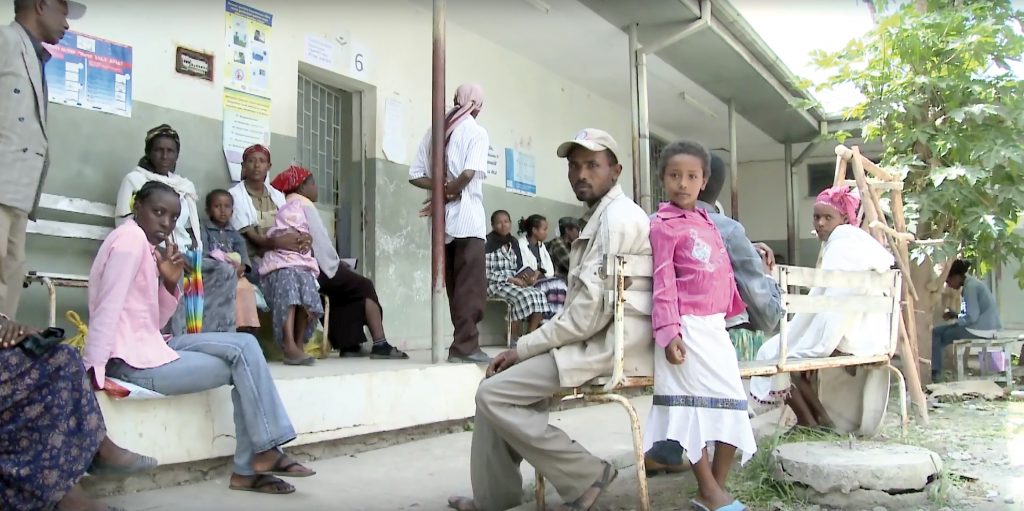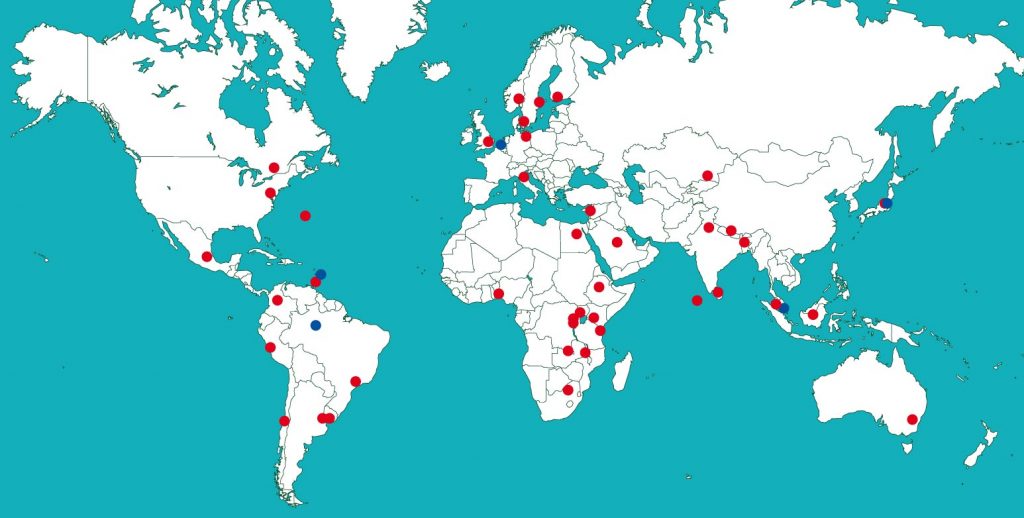Despite a rapid rise in cancer cases in low- and middle-income countries, many governments have been disastrously slow to turn their attention to planning and implementing cancer services, thanks in no small part to the priorities set by the international development community.
The Millennium Development Goals, adopted in the year 2000, which set the political and funding priorities for global development efforts for the following fifteen years, notoriously lacked any reference to cancer or any other so-called non-communicable disease, thereby ensuring that the cause of cancer control was relegated to the lowest rungs of national priorities.
In an effort to redress this situation, the international cancer community mobilised to get cancer onto the agenda of the World Health Organization (WHO), succeeding in getting a Cancer Resolution passed by the World Health Assembly in 2005. Three years later this was followed with the World Cancer Declaration, a globally applicable ‘road map’ for developing and implementing cancer plans, which was developed and launched by the Union for International Cancer Control (UICC), the largest international organisation dedicated to helping the global health community accelerate the fight against cancer.
According to UICC’s Deputy CEO, Julie Torode, while awareness and attitudes did start to change, this was slow to translate into the implementation of effective cancer control programmes. “We saw that, particularly in lower-income settings, governments expressed fear of allocating development assistance to cancer control – a topic outside of the remit of the Millennium Development Goals,” she says.
It was against this background that in 2009 UICC took a bold strategic decision to throw its weight behind proposals to try to kick-start action across non-communicable diseases (NCDs), by forming an alliance with other international bodies such as the International Diabetes Federation and World Heart Federation. “In order to move the cancer agenda forward, we felt we had to shape the cancer response within the framework of NCDs,” she says.
The NCD Alliance, which soon expanded to include the International Union Against Tuberculosis and Lung Disease, aimed to create momentum around the four main diseases that had previously received very little political commitment or funding – diabetes, cardiovascular and respiratory diseases, and cancer – by bringing together organisations that had global reach and long-standing relations with WHO, and the ability to translate global policy into national action through their members on the ground.
It quickly notched up some important successes, starting with the UN High-level Summit on NCDs in 2011, which finally established NCDs as a key development issue requiring the attention of heads of state and governments.
UICC’s decision to focus so strongly on building the NCD Alliance was, however, greeted with some scepticism among certain sections of the cancer community, who felt that by working alongside others, the task of planning and implementing integrated cancer services across prevention, early detection, treatment and palliation could be undermined in favour of strategies focusing on the lifestyle and environmental risk factors cancer has in common with other NCDs.
Seven years on, Torode believes the UICC approach is starting to have real traction. The High-level Summit was important in debunking the myth that cancer and other NCDs are diseases of affluence. It culminated in the 2011 UN Political Declaration on the Prevention and Control of NCDs, which acknowledges that NCDs contribute to 67% of annual deaths, with the most rapidly growing burden falling in developing countries.

The NCD Alliance has since been building a growing movement, shadowing the development of the WHO Global Action Plan on the Prevention and Control of NCDs 2013–2020, and pressing for targets and indicators in support of the overarching goal of reducing premature deaths from NCDs by 25% by 2025.
A strong voice for cancer
Together, the NCD Alliance and UICC were able to emphasise both the health promotional and disease management aspects of chronic diseases, taking the opportunity to open a discourse on the ‘health system response’,” says Torode. “When you move along the cancer journey, and look at the infrastructure required for early detection, strong referral, diagnosis, and treatment and care, using a multidisciplinary approach, a cancer-specific response is needed,” she explains. “We pushed for health system response targets – and even if these are quite minimal in the Action Plan, UICC played a strong role in ensuring they were articulated.”
“The Global Action Plan for NCDs,” she adds, “includes a framework of indicators that start to shape a cancer plan for a country. Furthermore, when governments report back on NCDs at UN level, they have to define their cancer burden by type per 100,000 population, which implies investing in a population-based cancer registry. There are clear indications for vaccination on hepatitis B and HPV and early detection of some key cancers. And we also fought for the section recommending cost-effective interventions – so it is a live document,” she says. The recent consultations on updating this appendix will bring additional strong guidance for making the right investments for cancer control, adds Torode, citing a basic package on palliative care that has been costed for cancer as a recently added feature.
As the Millenium Development Goals timeline drew to a close, a new opportunity opened up to secure a place for cancer and NCDs at the heart of global development efforts, as discussions coalesced around the Sustainable Development Goals to be agreed in 2015.
Torode stresses the important role the maturing NCD Alliance played in contributing to this agenda. “We particularly welcome the holistic approach to NCDs across all 17 of the Sustainable Development Goals, as well as the health focus on universal health coverage.”
UICC is now working with its members and NCD Alliance partners to ensure effective cancer plans are set up as part of national development plans, and that expertise and civil society power that exist in the country are harnessed to achieve this end. These efforts include organising regional workshops and training sessions to provide advice and build capacity on national cancer control plan development and implementation with partners in the International Cancer Control Partnership (www.iccp-portal.org).
“The cancer plan must be right for the country and make sense against the burden and capacity to respond in that particular setting. This is why having cancer registries in place is so important,” says Torode. “When countries are just getting started on national plans, it can be quite intimidating to develop complex plans across the care continuum that are feasible and financed. That said, the number of national cancer control plans in the public domain is increasing slowly but surely.”
Challenges and benefits of an NCD-wide approach
A more integrated and holistic approach to NCDs is starting to become evident in many countries. “In women’s cancers we are beginning to see engagement with the child maternal health community, and the integration of cervical cancer vaccination and screening services,” says Torode. “And in breast cancer we are seeing community level engagement, promoting breast health, signs and symptoms and early detection. For example, in Ghana, the Community-based Health Planning and Services (CHPS) programme, initiated in 1999, now trains its community health workers, which is an excellent example of the importance of getting the foundations of a health service in place,” says Torode.
Concerns among the wider cancer community that the specific needs of cancer could get side-lined within broader national NCD action plans do seem to be shared to some extent by people active at a national level. In Ethiopia, the second largest country in Africa, with a population of more than 100 million, the government has put in place a strategic framework on NCDs, which now account for 34% of mortality and morbidity in the country.
Wondu Bekele Woldermariam, General Manager of the Mathiwos Wondu-YeEthiopia Cancer Society (MWECS – mathycancersoc.org) and Focal Person for the Consortium of Ethiopian NCD Associations, insists, however, that this broad-based framework needs to be complemented with disease-specific programmes. “Without an official cancer programme tied to government we won’t be effective in tackling cancer in Ethiopia,” he argues.
Wondu and his team at the cancer society were heavily involved in the launch, last October, of Ethiopia’s national cancer control plan. A country-wide population-based can-cer registry, and five regional registries, are included in the plan along with radiotherapy services in five regions. With support from an international foundation, MWECS recruited a technical advisor to assist in developing the plan, which was sent for review by UICC and others before being submitted to the Health Ministry and ultimately adopted by the government last year. But with only 4.7% of Ethiopia’s national budget allocated to health, the amount of funding available to implement the plan will clearly be highly limited, particularly given the pressing problems of communicable diseases such as HIV, malaria, and TB.
Ethiopia has the great advantage of already having a well-developed primary healthcare system, with 15,000 health posts over the country, each with two health extension workers, and more than 3,200 health centres, which are effectively mini hospitals. “We have already agreed with government that we cannot afford a vertical programme for NCDs – what we have to do is integrate NCD prevention, detection, care and palliation into existing structures,” says Wondu. We are about to launch guidelines on how NCDs can be managed at these existing facilities.”
One of the main challenges, he says, will be training the 38,000 health workers in new areas. “These are high school graduates, highly trained and competent, but they are already very busy with issues of hygiene, sanitation and communicable diseases,” he says. “We need to now train them in awareness and prevention of NCDs.”
Wondu says he is looking forward to the publication of Ethiopia’s new NCD strategic action plan, due out soon, and hopes it will recognise the need for attention to be paid to the specific diseases, and address some of the priorities for cancer.
Many countries, however, still don’t have cancer control plans. One of them is Malaysia, a country with a fast-growing population of more than 30 million. Saunthari Somasundaram, President and Medical Director of the National Cancer Society of Malaysia, says that having been through a period of rapid development, the country now has the highest obesity levels in the region, and the government is very focused on trying to address this and other lifestyle risk factors.
“Malaysia has really embraced the NCD concept,” she says, “and we very much follow WHO guidelines.” MySihat, the Malaysian Health Promotion Board, rolls out programmes to address the risk factors of NCDs, namely tobacco, alcohol and physical inactivity, and civil society organisations are active in promoting healthy lifestyles. But Somasundaram argues that the specific issues of cancer are not getting the attention they need. “A flaw in the Malaysian NCD plan is that, even though it does refer to cancer, it does not emphasise it, and even if cancer is an NCD, and we share risk factors, it is never mentioned in the same breath as diabetes, heart disease and obesity – the problem is that it is not really seen as being a preventable disease.”
Working together does, however, give all disease interests added impact on issues of common concern, such as forcing the government to turn its rhetoric on smoking into action, which it is currently resisting in the face of a powerful tobacco lobby. Plans are afoot to launch a Malaysian NCD Alliance, which is expected to be up and running by the end of 2016 and will be spearheaded by the National Cancer Society of Malaysia. And the global health spotlight will soon turn to Malaysia as they prepare to host the next World Cancer Congress in 2018 – hopefully showcasing progress in these areas.
Regional and national NCD Alliances
There are now more than 50 national and regional NCD alliances around the world. Katie Dain, Executive Director of the NCD Alliance says they have been emerging organically since the NCD Alliance was established in 2009. “The driver has really been the impact we have had at the global level, and the recognition that by coming together across diseases and risk factors, civil society organisations will essentially be stronger,” she says.

The concept is summed up by the Sharjah Declaration, adopted at the first Global NCD Alliance Forum in 2015, which states that: “No one sector alone will reverse the NCD epidemic, but working together we have the tremendous opportunity to chart a new course toward health and sustainable human development for a more equitable and healthier future for all.”
Whether these national alliances will be sufficiently strong to influence governments in the interests of citizens’ health may, however, depend on the level of support they can call on. In addition to managing the Mathiwos Wondu-YeEthiopia Cancer Society, Wondu also runs the country’s national NCD Alliance together with a colleague working in diabetes, but he doubts they can have much impact on government policies with the very limited resources at their disposal. “We have no office, we are not remunerated for our work, we have no permanent staff. We need support from our partners, the NCD Alliance and UICC, to help provide additional capacity. Being Africa’s second most populous country, whatever we do here will rub off on other countries, but we need help to make real progress.”
In Malaysia, a richer, more developed country, Somasun-daram says that the regional NCD Alliance has already been a major driving force for civil society action against NCDs in her own country and the region. “The ASEAN [Association of Southeast Asian Nations] NCD Alliance was created off the back of the global NCD movement and we are looking forward to our very own Malaysian NCD Alliance.” The Sharjah Declaration, she says, “provides a template for civil society action, and is hugely helpful for us to look to when we mobilise our existing capacity, in the absence of national guidance.”






No doubt that in developing countries communicable diseases have high importance. However, this cannot be reason to forget the fight against cancer. Actually the world spend about 2000 billion $ a year for war and exportation of arms in developing countries. Let´s use a part of this enormous amount of money for the war on cancer.